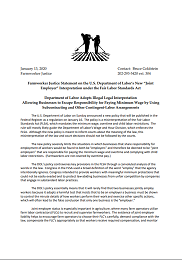Department of Labor Adopts Illegal Legal Interpretation Allowing Businesses to Escape Responsibility for Paying Minimum Wage by Using Subcontracting and Other Contingent-Labor Arrangements
The U.S. Department of Labor on Sunday announced a new policy that will be published in the Federal Register as a regulation on January 16. The policy is a misinterpretation of the Fair Labor Standards Act (FLSA), which mandates the minimum wage, overtime and child labor restrictions. The rule will mostly likely guide the Department of Labor’s Wage and Hour Division, which enforces the FLSA. Although the new policy is meant to inform courts about the meaning of the law, this misinterpretation of the law and court decisions should not be followed by the courts.
The new policy severely limits the situations in which businesses that share responsibility for employment of workers would be found to both be “employers” and therefore be deemed to be “joint employers” that are responsible for paying the minimum wage and overtime and complying with child labor restrictions. (Farmworkers are not covered by overtime pay.)
The DOL’s policy contravenes key provisions in the FLSA through a convoluted analysis of the words in the law. Congress in the FLSA used a broad definition of the word “employ” that the agency intentionally ignores. Congress intended to provide workers with meaningful minimum protections that could not be easily evaded and to protect law-abiding businesses from unfair competition by companies that engage in substandard labor practices.
The DOL’s policy essentially means that it will rarely find that two businesses jointly employ workers because it adopts a harmful test that insists that to be an employer a business must be shown to control the minute details of how workers perform their work and exercise other specific actions, which will often lead to the false conclusion that only one business is the “employer.”
Joint employer status is especially important in agriculture, where many farm operators utilize farm labor contractors (FLCs) to recruit and supervise farmworkers. The existence of joint employer liability helps to encourage farm operators to choose their FLC’s carefully, demand compliance with the law, compensate the FLC’s appropriately so that workers receive required compensation, and monitor their conduct. Too often, when farmworkers suffer violations of their rights, a farm operator denies it is the “employer” of the workers and the farm labor contractor lacks the assets to pay a court judgment.
“By sending the message that the Department of Labor’s enforcement will rarely find joint employer liability in common situations where wage theft occurs, the agency encourages some farm operators to ignore what happens on their farm, including substandard wages and use of underage child labor,” said Bruce Goldstein, President of Farmworker Justice, which submitted comments on the proposed rule that were quoted and dismissed by the Department of Labor in explaining its final decision. “The rule creates an incentive for farm operators to minimize their labor-related costs by paying farm labor contractors at levels that are inadequate to provide farmworkers with the minimum wage and ignoring the use of child labor on the farm,” he added.
Farmworker Justice is a national advocacy and litigation organization for farmworkers, and has a long history of seeking enforcement of the joint employer liability concept due to rampant wage theft and widespread use of farm labor contractors who are used to evade the law. Information about the Joint Employer issue is available on our website. https://www.farmworkerjustice.org/resources/immigration-labor/labor-rights-farmworkers/joint-employer-standard
###
Read moreFarmworker Justice Statement on the U.S. Department of Labor’s New “Joint Employer” Interpretation under the Fair Labor Standards Act





